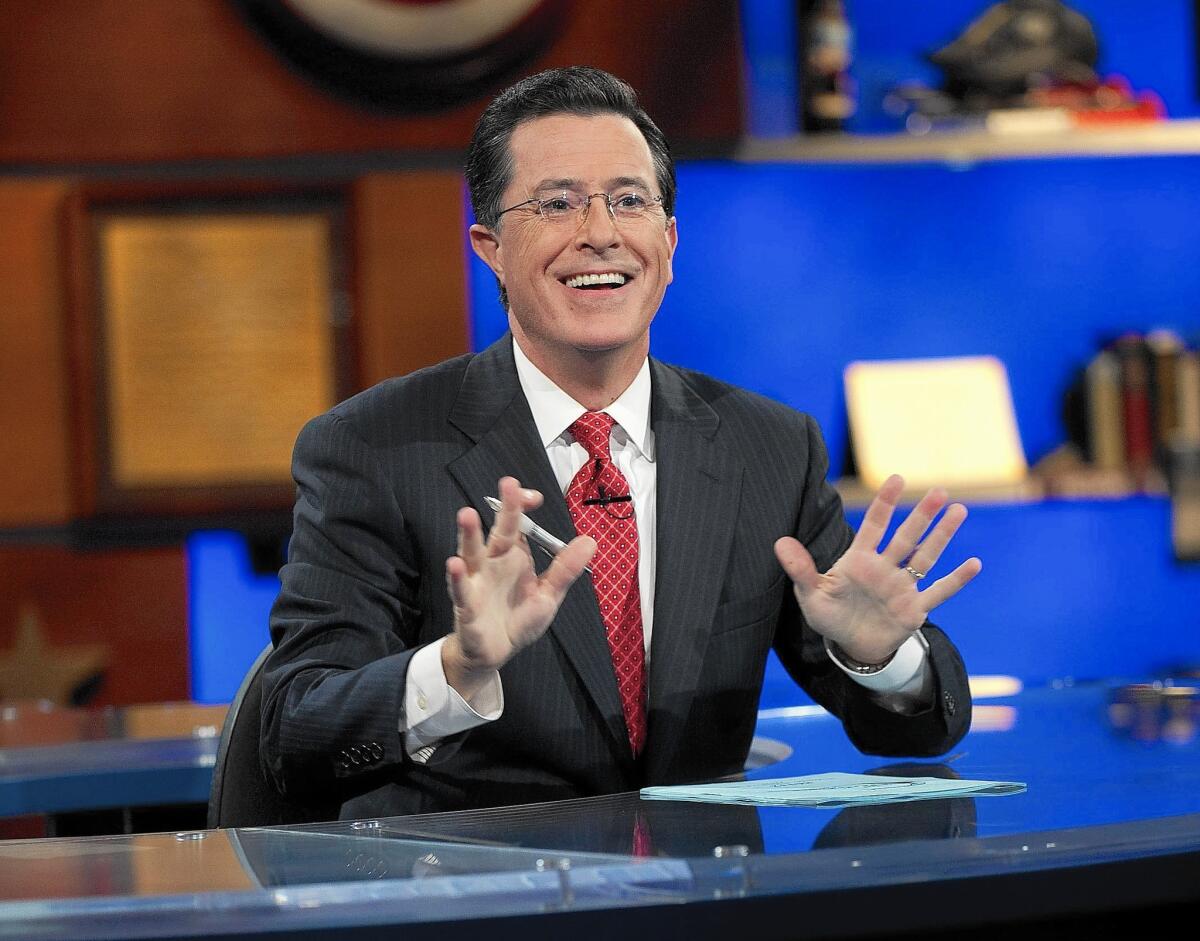Stewart’s exit is no joke at Comedy Central

With Jon Stewart leaving his post on “The Daily Show,” the joke may be on Comedy Central.
The departure of Stewart — who announced on Tuesday that he will exit his signature mock-news program sometime later this year — presents the 24-year-old cable network with one of the biggest quandaries in its history, far beyond the immediate question of who might succeed him.
Combined with the loss last year of Stewart protege Stephen Colbert, Viacom-owned Comedy Central will be bereft of two major stars who brought in a constant stream of attention and ad dollars. Stewart’s shop — working under the banner of the host’s production company, Busboy Productions — has also served as a key talent incubator for the channel, giving rise to the careers of Colbert, Steve Carell, John Oliver, Larry Wilmore, Lewis Black, Michael Che and many others.
FULL COVERAGE: Jon Stewart on ‘The Daily Show’ and beyond
“Revenues from both ‘The Daily Show’ and ‘The Colbert Report’ made it financially feasible for Comedy Central to take risks on new shows,” said Lisa Rogak, whose Stewart biography, “Angry Optimist,” was published last year. “Without that money flowing into the coffers, the channel will be more hesitant to develop anything but the most cheaply produced shows … It’s a huge blow.”
Jeffrey McCall, a media studies professor at DePauw University, agreed: Stewart “was clearly the tentpole for the entire channel,” he said. “He was appointment viewing for his viewers, many of whom would otherwise have not bothered to find Comedy Central on the cable lineup.”
The effect will be greatest among the young, well-educated and affluent viewers who see Stewart as a house critic of the Beltway and media elites.
The heat is on Michele Ganeless, the Comedy Central president now tasked with finding the right successor to lead the network’s No. 1 late night show.
“It’s a seismic shift for sure, for late night and for Comedy Central,” she said in an interview Wednesday.
But she added: “Comedy Central has always been in the business of reinventing itself … The brand has never been stronger.” She said network policy prevented her from discussing financial specifics.
The network still has a number of popular and acclaimed shows, including “South Park,” “Key and Peele” and “Inside Amy Schumer.” Comedy Central boasts of being the No. 1 network in late night among young men — a hard-to-reach demographic that advertisers will pay top dollar to attract.
It’s also one of the most widely distributed cable channels in the U.S., with 97.3 million subscribers. And through customers’ cable and satellite TV bills, it earns a relatively rich 22 cents per month on each subscribers, up 10% from 2014, according to research firm SNL Kagan.
On the other hand, Stewart and Colbert were two of the big reasons Comedy Central could command that kind of money. (Ratings for the show are down about 13% year to date, but it’s drawing a respectable 2.1 million viewers, according to Nielsen.)
“Stewart’s departure will hit a reset button for the network,” said Brad Adgate, an analyst with ad firm Horizon Media in New York.
Stewart had hosted a short-lived MTV show in the early 1990s but was struggling to find his proper niche when he took over “The Daily Show” in 1999. That show’s original host, Craig Kilborn, had left to do a late-night program on CBS.
Under the tutelage of Stewart and writer Ben Karlin, “Daily Show” became a must-see for the media elite, with the host railing against what many saw as political and journalistic hypocrisy during the era of 9/11, the Iraq war and beyond.
Comedy Central has indicated that it intends to keep the “Daily Show” brand alive, albeit with a new host. The network, which makes around a quarter-billion dollars annually in subscriber fees alone, has shown it will pay well for talent. According to reports, Comedy Central shelled out around $6 million annually to Colbert and between $25 million and $30 million per year to Jon Stewart.
But it remains to be seen how the show might adapt to fit that personality. Ranking high on the list of possible successors is John Oliver, the British-born comic who rose to prominence as a “Daily Show” correspondent and won plaudits as a guest host when Stewart took time off to make his feature film, “Rosewater,” in 2013.
But Oliver left to do his own mock-news show for HBO, “Last Week Tonight,” which has garnered critical acclaim. Oliver said recently he has no plans to leave.
Carell would be a big get for Comedy Central, but his film commitments would likely not allow him to contemplate doing a nightly TV show. Helms, a former “Daily Show” correspondent, has won new fans with his roles on series such as “The Office” and “Brooklyn Nine-Nine,” although it’s an open question whether he could carry the show by himself.
Cast members such as Samantha Bee, Jason Jones or Aasif Mandvi could be possible successors. Or the network could go with an outside pick or an unknown.
Whoever gets the nod, the “Daily Show” will be different.
Ganeless said she plans to take her time. “We don’t want to find Jon Stewart Lite,” she said. “Everything is on the table.” That includes a host who might come from either outside or inside the current talent roster.
“We have to find the next evolution of ‘The Daily Show,’” Ganeless said. “What does ‘The Daily Show’ after Jon Stewart mean?”
Twitter: @scottcollinsLAT
More to Read
The complete guide to home viewing
Get Screen Gab for everything about the TV shows and streaming movies everyone’s talking about.
You may occasionally receive promotional content from the Los Angeles Times.







